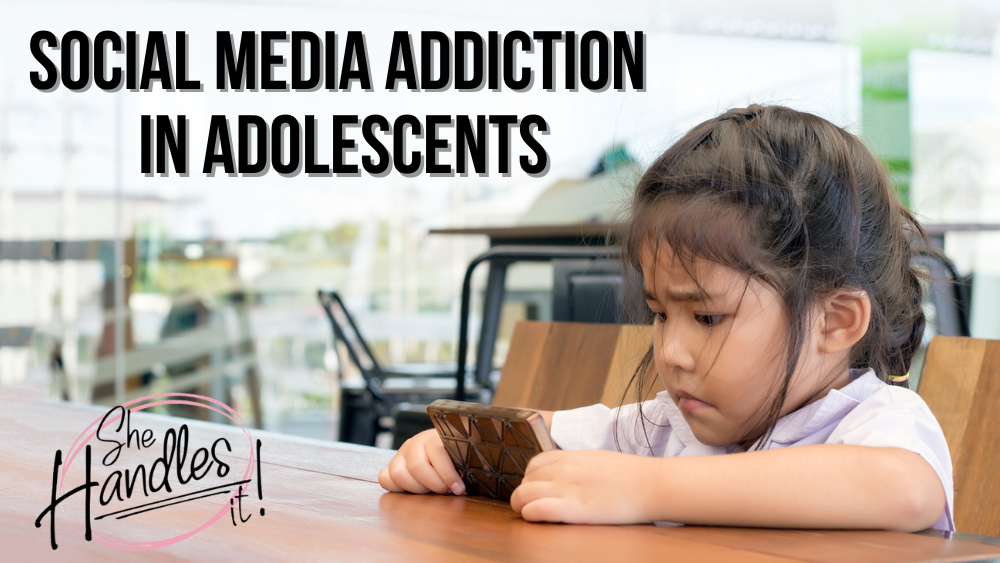In today’s digital world, social media has become embedded into many parts of our lives, especially for adolescents. With the ever-increasing popularity of platforms like Facebook, Instagram, Snapchat, and TikTok, young minds are immersed in a virtual world that can bring both benefits and drawbacks. However, as the line between online and offline realities blurs, the rise of social media addiction has become a concerning issue.
Can’t Log Off?
First, I think it’s essential to answer the question, What is social media addiction? A great blog by The Lanier Law Firm defines social media addiction as “The compulsive urge to access and engage with social media platforms at the expense of attending to other areas of your life.
While adults are not immune to the urges of social media use, kids and teens are more susceptible because their neurological development is still progressing, particularly executive functioning and decision-making abilities.”
Caught in the Comparison Trap
Social media platforms are designed to captivate users and keep them engaged for as long as possible. Their algorithms are built to exploit human psychology, making it easy for adolescents to become addicted. The need for validation, the fear of missing out (FOMO), and the constant comparison with peers can drive adolescents to spend excessive amounts of time scrolling through their feeds, negatively affecting their mental health and overall well-being.
The constant exposure to carefully curated highlight reels of others’ lives can fuel feelings of inadequacy, anxiety, and depression in adolescents. The pressure to present a perfect image online can be overwhelming, leaving many young individuals feeling like they are falling short. Moreover, the constant bombardment of notifications, likes, comments, and shares can create a cycle of seeking external validation, negatively impacting self-esteem and self-worth. Social media isn’t reality. However, most young minds are not yet equipped with the mental capacity to understand that what they see is a snapshot, not the whole picture of someone’s life.
From Likes to Loneliness
Social media addiction often leads to a sedentary lifestyle, as adolescents spend countless hours hunched over screens. Lack of physical activity can contribute to various health problems, including obesity, poor posture, and musculoskeletal issues. Additionally, the blue light emitted by screens can disrupt sleep patterns, leading to sleep deprivation, affecting overall health and cognitive functioning.
As adolescents spend more time engrossed in their digital lives, their real-world relationships may suffer. Face-to-face interactions are essential for developing social skills, empathy, and emotional intelligence. Excessive reliance on virtual communication can lead to a decline in meaningful connections, leaving adolescents feeling isolated and disconnected from their peers. It can create extreme social anxiety and an inability to communicate in the “real world.”
How to Overcome Social Media Addiction and Reclaim Your Life
Social media addiction affects millions globally, impacting mental health, personal relationships, productivity, and overall life satisfaction. But the good news is, it’s not a life sentence. This section explores a series of actionable strategies designed to help you navigate the pitfalls of social media dependence.
From setting boundaries on usage time to promoting activities that don’t involve screens, this section offers practical, tangible advice for breaking free from digital shackles. It encourages open communication about online experiences, helping you to address any anxieties or problems related to social media use. It also emphasizes the importance of digital literacy, equipping you with the critical thinking skills necessary to discern the reliability of online information.
Most importantly, this section underlines the role each of us can play in demonstrating healthy social media behavior. Whether we are parents, educators, or simply concerned individuals, we can all set an example for others to follow. We can show that while social media is a powerful tool for connection, it’s vital to disconnect periodically and maintain a healthy balance in our lives.
- Set boundaries: Encourage adolescents to establish limits on screen time and define specific periods for social media usage. Designate tech-free zones like the dinner table or bedroom to foster healthy offline interactions.
- Encourage offline activities: Promote physical exercise, hobbies, and creative pursuits that do not involve screens. Encouraging adolescents to engage in enjoyable activities can help divert their attention from social media.
- Foster open communication: Create a safe and non-judgmental space where adolescents can discuss their online experiences. Encourage them to share their concerns, struggles, and triumphs, and provide guidance on navigating the complexities of social media.
- Educate about digital literacy: Teach adolescents about the importance of critical thinking, online privacy, and responsible social media usage. Equip them with the skills to evaluate the authenticity and reliability of the information they encounter online.
- Be a positive role model: Adolescents learn by example, so it’s crucial to model healthy social media behavior. Demonstrate the importance of disconnecting from screens, maintaining a healthy balance, and using social media for positive connections.
Unplugged and Thriving
Adolescents‘ addiction to social media is a serious concern in the digital era we’re living in. We need to understand that this issue can negatively affect their mental health, physical well-being, and personal relationships.
So, let’s take a proactive approach to solve this problem. How about we set boundaries, promote activities that don’t involve screens, encourage open conversations, teach them about digital literacy, and serve as positive role models ourselves?
It’s a conversation we need to have, for their sake and ours.
Last modified: June 12, 2023










